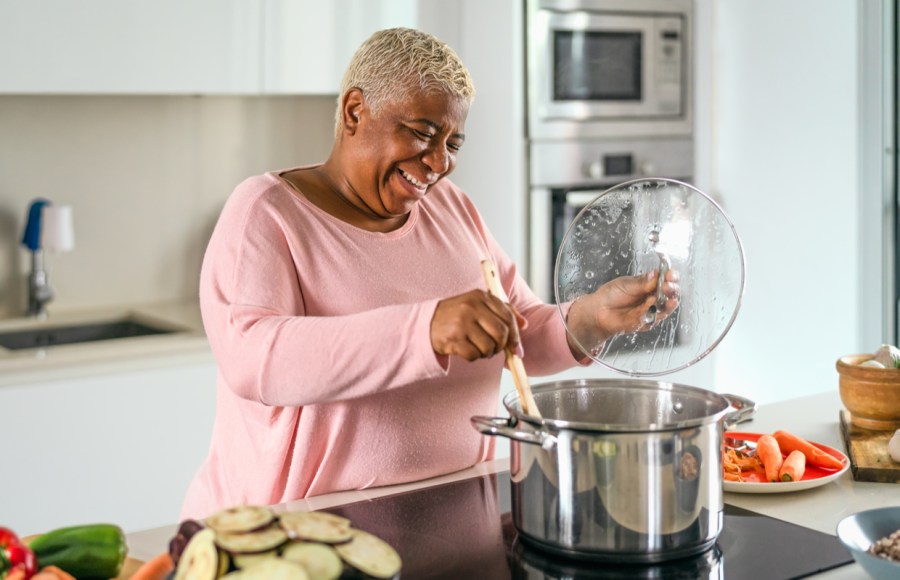With cold and flu season in full swing, it’s time to boost your immunity. We reveal some simple diet and nutrition tips, which could strengthen your immune system this winter…
Our immune system is a complex, intricate network of cells (collectively called white blood cells), molecules and organs, that have evolved over millions of years, shaped by the environments in which you live, according to Dr Jenna Macciochi, an immunologist working with Healthspan and author of The Science of Staying Well…
‘Parts of your immune system can be found everywhere in your body, but tend to be clustered at the barriers to your body – for example, the digestive tract and lungs – where there is greatest exposure to your environment,’ she says.
‘Your immune system is really your wellness system, with vital roles far beyond just fighting germs.’
The main fixture in conversations around immunity is often around its role in protecting you from infection. However, it’s actually a much bigger deal.
‘Running deep into every aspect of your mental and physical health, your immune system is really your wellness system, with vital roles far beyond just fighting germs,’ says Dr Jenna.
In fact, it plays a major role in every single aspect of your mental and physical health: from metabolism to the microbiome, healing and growth, brain function, cancer and even mood.
‘Rather than a binary switch that we want to turn on, ‘boost’ even, it’s more like a set of rheostats that need balancing; switching on when appropriate and off again when not needed,’ Dr Jenna explains.
Cold and flu season: best foods and nutrients to support your immune system this winter
Of course, taking care of your immune system should be a priority for life and longevity, not just for the usual glut of seasonal colds and flu (or a pandemic). But there are practical steps you can take to care for your immune system this winter including:

Lots of macronutrients play an important role in regulating the immune system.
1. Top up your vitamin and mineral intake
Several micronutrients have been found to play an important role in supporting the body’s defences. This includes vitamins A, B vitamins, C, D, E and K, as well as copper, iron, selenium and zinc.
Try taking a high quality multivitamin that contains all of these important macronutrients. We recommend Inessa Advanced Daily Multivitamin (£27.99 for 60-day supply).

The lack of sunshine in winter can cause us to become deficient in vitamin D. This can negatively affect the immune system.
2. Boost your vitamin D levels for healthy immune function
It is challenging to obtain enough vitamin D from diet alone. This is because it is primarily produced when your skin is exposed to UVB from sunlight.
‘Few foods contain a natural source of vitamin D and these include salmon and mushrooms,’ says Rob Hobson, a registered nutritionist. However, the most effective way to get your vitamin D during the winter months is to supplement.
Try Healthspan Super Strength Vitamin D3 (£3.95, for 60 tablets).
Click here for more info on the health benefits of vitamin D!

Include a range of beans, pulses, wholegrains, fruits and vegetables in your diet to increase your fibre intake.
3. Aim to get a diverse and abundant intake of dietary fibre
Fibre is needed to feed your gut bugs, collectively known as your gut microbiota (GM). Your GM are the main educators of your immune system. Therefore, they have a huge influence on its overall function.
‘In the UK, we are just not eating enough fibre,’ says Dr Jenna. ‘You should be aiming for 30 grams a day and 30 different plant foods in a week.’ The easiest way to achieve this is through including a diversity of plant foods. Try adding in as many colours of fruit and veg as you can and including beans, pulses, legumes and wholegrains in your meals.

Evidence suggests that probiotic supplements may support proper immune function against minor winter infections.
4. Add ‘live and active’ bugs from probiotic sources to your diet
If you suspect your gut health is less than great or wish to try a probiotic, look for supplements that contain some of the most well-studied probiotic strains including lactobacillus and bifidobacterium, suggests Dr Jenna.
‘There is some scientific evidence that lactobacilli and bifidobacterial supplements may be effective in supporting proper immune function against minor winter infections,’ she says.
Of course, we can’t forget that diet and supplements are only ever part of the story. Nutrition needs to be in the context of a 360-lifestyle approach. ‘Building in consistency through routines that keep us active, relaxed and able to get good-quality sleep is key,’ says Dr Jenna.







